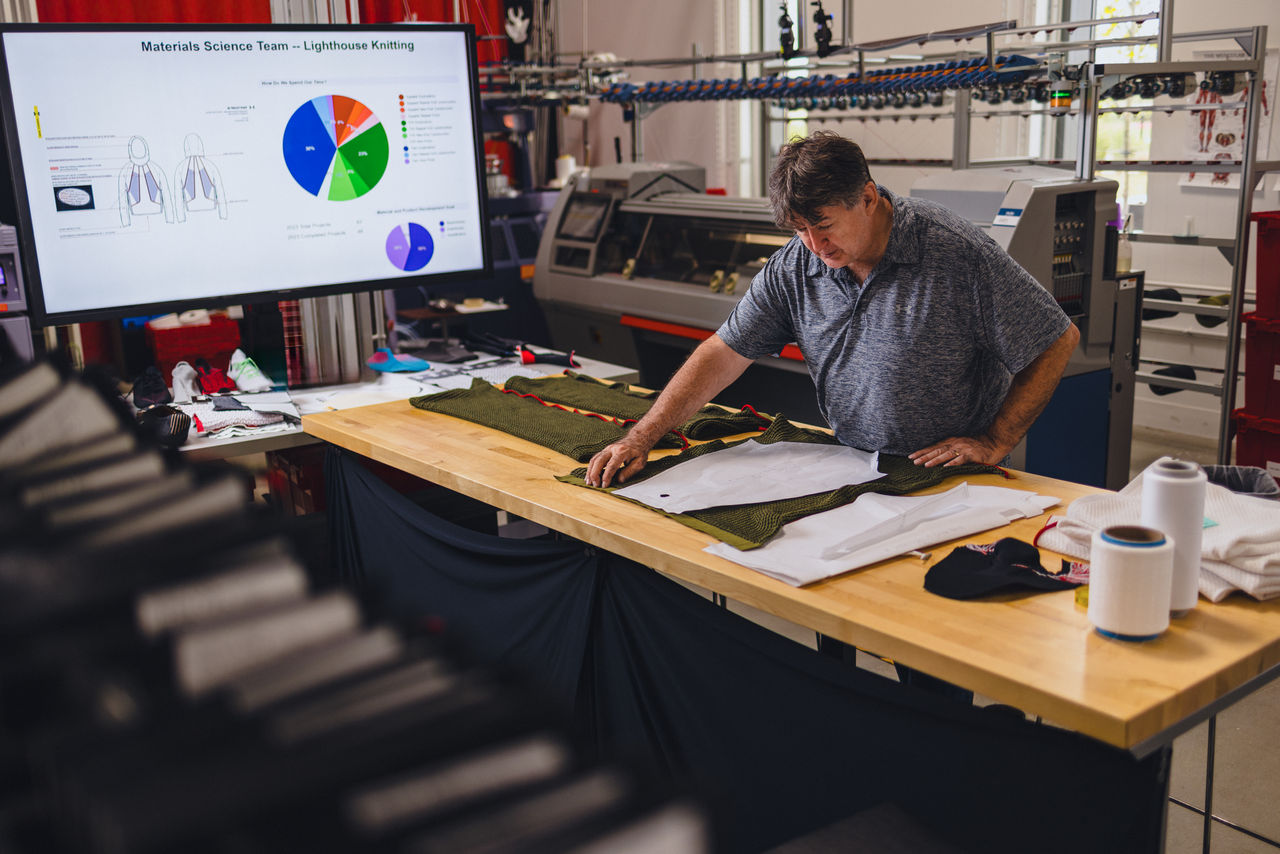GRI Standards: 2-29, 3-1, 3-2, 3-3
Understanding sustainability issues relevant to our business and key stakeholders is essential to our sustainability reporting process.

Sustainability materiality assessment
We completed a sustainability materiality assessment in 2021 that aligned with the Global Reporting Initiative (GRI)1 to identify and prioritize the sustainability and ESG issues important to our business and key internal and external stakeholders. The assessment helped inform the content of this report and our sustainability strategy, What’s Under Matters. We are committed to continuing to evolve our understanding of, and approach to, priority sustainability issues while sharing where we stand today.
We then worked to rank, weight and normalize interview results, allowing us to group issues according to their relative priority. While results differed between internal and external stakeholders the process also revealed connections among certain challenges, presenting an opportunity to address them more efficiently.
1 Global Reporting Initiative (GRI) is an independent, international organization providing organizations with a common language to communicate their impact. We began conducting GRI-aligned materiality assessments in 2014 and will continue to do so in the coming years, refining the systems that carry our work forward. For more on GRI, go to https://www.globalreporting.org/about-gri/
Top 10 Material Issues
01. | 02. | 03. | 04. | 05. |
Supply Chain Transparency | Compensation& Benefits | Diversity, Equity & Inclusion | Innovation & Economic Performance | Circularity |
06. | 07. | 08. | 09. | 10. |
Energy & CarbonEmissions | Biodiversity | Digital Transformation | Customer Engagement & Satisfaction | Community Impact & Engagement |

Our Sustainability Materiality Assessment Approach
The 2021 sustainability materiality assessment took place in three phases:
Phase 1:
We conducted a comprehensive peer analysis and reviewed our internal materials, policies and reports.
Phase 2:
We conducted in-depth interviews with external and internal stakeholders.
- Internal stakeholders included teammates from 18 areas across the organization, including sustainability, sourcing, product and materials innovation, people, community impact, consumer insights, real estate, retail, operations, legal, finance, investor relations, government relations, and others.
- External stakeholder interviews included leaders and experts in environmental, social and governance (ESG), sustainability, and the apparel and footwear industry, representing six organizations—Ceres, the Fair Labor Association, the Sustainable Apparel Coalition, Global Fashion Agenda, Better Buying Institute, and Leadership & Sustainability.
Phase 3:
We analyzed the findings and developed our top 10 priority issues.
Management of Material Topics
GRI 3-3
In order to best address GRI 3-3 we’ve created a section that lists out all of our material topics and how we manage them. For every material topic we’ve identified, below we define it, discuss its impacts, related policies and commitments, how we manage its impacts and how we track its impacts.
Provide detail for the names, addresses, and other important information about UA’s key suppliers manufacturing UA branded products, workforce/labor composition, and related health and safety standards
Business Connection:
UA Business Relationships
Impacts:
Safer and healthier working conditions
Strengthened consumer loyalty
Responsible sourcing
Policies/Commitments:
Fair Compensation Commitment Statement
See FY2023 Sustainability & Impact Report for related sustainability goals
Managing Impacts:
The execution of our policies/commitments helps manage material impacts. Additionally, impacts are managed through:
Under Armour Sustainable Assessment Tool and Report
Under Armour Worker Voice Program
Under Armour WeCare Program
SAC Higg Facility Environmental Module
Higg Brand and Retailer Module
Tracking Impacts:
See FY2023 Sustainability & Impact Report for tracking updates on related sustainability goals
Establish fairness around financial incentives, salaries/payments, and benefits (such as medical, dental and financial) provided to employees
Business Connection:
UA Activities
Impacts:
Access to resources for enhanced health
Encourages investment into the economy
Policies/Commitments:
UA is committed to providing Strong Benefits to its teammates
FLA Membership
Committed to achieving pay equity for all teammates
See FY2023 Sustainability & Impact Report for related sustainability goals and commitments
Managing Impacts:
See our annual Proxy Statement
The execution of our policies/commitments helps manage material impacts. Additionally, impacts are managed through:
- Human Capital and Compensations Committee within our Board of Directors
Tracking Impacts:
See FY2023 Sustainability & Impact Report for tracking updates on related sustainability goals
Ensure diversity of expertise, background, and ideas through the demographic composition of UA’s workforce and board members (i.e., gender, race, ethnicity, ability or disability, veteran status, age); promote justice, impartiality, and fairness within the procedures, processes, and distribution of resources in order to ensure UA as a welcoming place to work
Business Connection:
UA Activities
Impacts:
Equal opportunities for employee advancement
Diversity of thought in leadership’s decision making
Increased operational innovation
Policies/Commitments:
See Pillars and Commitments of our DE&I team
‘Stand for Equality’ company value
See FY2023 Sustainability & Impact Report for related sustainability goals
Managing Impacts:
The execution of our policies/commitments helps manage material impacts. Additionally, impacts are managed through:
DE&I Operating Model
Global Teammate Equity and Accountability Movement Council
Nine Teammate Resources Groups
ESG Task Force
Tracking Impacts:
See FY2023 Sustainability & Impact Report for tracking updates on related sustainability goals
See Under Armour DEI Update website
Foster UA’s ability to drive long-term, sustainable growth and acquire new consumers while remaining competitive by prioritizing and leverage entrepreneurism, innovation, creativity and thought leadership for better business results
Business Connection:
UA Activities
Impacts:
Unique and creative talents leveraged
Innovative operations lead to less finite resources in production
Greater consumer based reached
Policies/Commitments:
See “Management’s Discussion and Analysis of Financial Condition and Results of Operations” within our Annual Report
See FY2023 Sustainability & Impact Report for related sustainability goals
Managing Impacts:
The execution of our policies/commitments helps manage material impacts
See “Management’s Discussion and Analysis of Financial Condition and Results of Operations” within our Annual Report
Tracking Impacts:
See FY2023 Sustainability & Impact Report for tracking updates on related sustainability goals
Keep products and materials in use and out of landfills while regenerating natural resources. Circular products and business models examine the total cycle costs and impacts of a garment, including raw material sourcing, manufacturing, processing, assembly, marketing, reuse or recycling and end-of-life disposal
Business Connection:
UA Activities
Impacts:
Consumers receive longer lasting products
Less waste goes into the environment
Innovative and employment opportunities
Policies/Commitments:
Our circularity ambitions are reflected in our goals to design and build products out of materials that are, or can be, recycled
See FY2023 Sustainability & Impact Report for related sustainability goals
Ellen MacArthur Foundation Membership
Managing Impacts:
The execution of our policies/commitments helps manage material impacts. Addtionally, impacts are managed through:
UA has a Director of Circularity who, in partnership with product teammates, drives strategy toward our circularity goals and mission
Tracking Impacts:
See FY2023 Sustainability & Impact Report for tracking updates on related sustainability goals
Increase renewables and proactively measure external operations outside of UA’s own operations as an effective way to decrease greenhouse gas (GHG) emissions and help curtail climate change. Apparel and footwear manufacturing are energy-intensive processes, and stakeholder engagement to address and reduce industry energy usage has increased in recent years
Business Connection:
UA Business Relationships
Impacts:
Less habitable environment for people
Greater chance of natural disasters
Increased opportunity to invest in renewable energy jobs
Policies/Commitments:
See FY2023 Sustainability & Impact Report for related sustainability goals
RE100 membership
Clean by Design partnership
Managing Impacts:
Impacts managed through execution of our policies, commitments, and strategic partnerships
Tracking Impacts:
See FY2023 Sustainability & Impact Report for tracking updates on related sustainability goals
Increase recycled fibers in the supply chain to help decrease the effects of resource depletion and the impact on the ecosystem quality, because the world's forests, swamps, plains, lakes and other habitats continue to disappear as they are harvested for human consumption. Increasing recycled fibers in the supply chain will help decrease the effects of resource depletion and the impacts on ecosystem quality
Business Connection:
UA Business Relationships
Impacts:
Leads to healthier environments for people to thrive
Creates more sustainable environmental conditions
Increased opportunity to innovate new business models
Policies/Commitments:
Clean by Design Initiative.
See FY2023 Sustainability & Impact Report for related sustainability goals
Managing Impacts:
Impacts managed through execution of our policies, commitments, and strategic partnerships
Tracking Impacts:
See FY2023 Sustainability & Impact Report for tracking updates on related sustainability goals
Prioritize digital channels, which are an increasingly important sales and marketing channel (e.g., e-commerce and digital community) and enable new logistics and sales fulfillment options through digitization to create innovative consumer acquisition, and inventory management to create a more resilient supply chain
Business Connection:
UA Activities
Impacts:
Less waste in operations
More dynamic consumer experience
Increased job opportunities
Policies/Commitments:
See FY2023 Sustainability & Impact Report for related sustainability goals
Color Accreditation Program advances the digital review and approval of colors, how fabrics and yarns are dyed, and the way anti-microbial and water-resistance properties are applied to textiles
Managing Impacts:
Impacts managed through execution of our policies, commitments, and strategic partnerships
Tracking Impacts:
See FY2023 Sustainability & Impact Report for tracking updates on related sustainability goals
Evaluate the degree to which consumers are satisfied with UA’s products and the likelihood they will continue to use them and recommend them to their peers (e.g., customer loyalty/affinity)
Business Connection:
UA Activities
Impacts:
More impactful product creation
Greater consumer loyalty
Opportunity for meaningful human engagement
Policies/Commitments:
See FY2023 Sustainability & Impact Report for related sustainability goals
The Only Way is Through Campaign
Managing Impacts:
Impacts managed through execution of our policies, commitments, and strategic partnerships
Tracking Impacts:
See FY2023 Sustainability & Impact Report for tracking updates on related sustainability goals
Create a substantial, lasting impact on communities worldwide
Business Connection:
UA Activities
Impacts:
Sense of purpose through work activities
Positive impact on communities
Greater sense of company pride
Policies/Commitments:
See FY2023 Sustainability & Impact Report for related sustainability goals
Managing Impacts:
Community Impact is managed through our Sustainability Governance Structure as one of our functional teams
Tracking Impacts:
See FY2023 Sustainability & Impact Report for tracking updates on related sustainability goals
Engaging with Stakeholders
Our stakeholders include our athletes, teammates, shareholders, communities, suppliers, business partners, customers, consumers and more. We value all our stakeholders' insights, ideas and feedback, and we seek their input to strengthen our approach and make sure we are covering the whole field.
How We Engage
We continually engage with our stakeholders through conversations, focus groups, interviews, surveys, social media and our investor relations website—striving to proactively share information that matters to them in addition to providing information by request.
Stakeholders, Engagement Methods, Topics2
Stakeholder Group | Examples of
| Examples of
| |
Communities and |
|
| |
| Consumers |
|
| |
| Government |
|
| |
| Peers/Industry |
|
| |
| Shareholders |
|
| |
| Suppliers |
|
| |
| Teammates |
|
| |
| Wholesale Customers |
|
|
2 Data based on 2021 Materiality Assessment results.
Memberships
Addressing sustainability is a team effort. It takes all of us at UA, plus collaboration with other external stakeholders. The challenges we face reflect complex, global issues that we can’t solve alone. That’s why we are working for change in partnership with our suppliers, fellow brands and other key partners who share our vision of a more sustainable industry and world. We seek sustainability collaborations that reflect our values and goals, and that can accelerate social and environmental solutions to benefit our industry’s global supply chain, including the people who work in it, and our shared planet.
Key Partners
We work with the Fair Labor Association (FLA) as an FLA-accredited company to improve working conditions for the people who make our products, support innovation and advance leading practices related to labor, health, and safety. We also serve on the FLA’s Board of Directors and Executive Committee and have previously served on its Audit and Manufacturing Committees.
We are a member of the Sustainable Apparel Coalition (SAC), a global, multi-stakeholder nonprofit alliance for the fashion industry. The SAC is made up of over 250 leading apparel, footwear and textile brands, retailers, suppliers, service providers, trade associations, nonprofits, nongovernmental organizations and academic institutions working to reduce environmental impact and promote social justice throughout the global supply chain.
We participate as a member of the Ellen MacArthur Foundation, a leading international charity that works with businesses, academia, policymakers, cities, and thought leaders across the globe to promote the circular economy. The Ellen MacArthur Foundation’s global Network assists the brand with evaluating collaboration opportunities across its global supply chain to reduce, reuse, repair, resell, and recycle resources.
Selected sustainability memberships
Organization | Focus | Participation/Year Joined |
AFIRM | Reduction of harmful substances in the apparel and footwear supply chain | Member, 2015 |
| America is All In | U.S. climate change agenda | Signatory, 2021 |
| Apparel Impact Institute Clean by Design | Climate Change, energy efficiency and water reduction | Partner, 2018 |
| CDP (formerly the Carbon Disclosure Project)* | Climate Change | Participant, 2016 |
| Ellen MacArthur Foundation | Circularity | Member, 2022 |
| Environmental Defense Fund Climate Corps | Climate Change | Collaborator, sponsor of Climate Corps Fellow, 2015 |
| Fair Labor Association | Supply chain workers' rights | Affiliate, board member, accredited company, accredited in 2019 |
| International Labour Organization (ILO), International Organization of Employers (IOE), International Trade Union Confederation (ITUC), Call to Action in the Global Garment Industry | Supply chain workers' rights and well-being | Endorser, task force member, 2020 |
| ILO Better Work | Supply chain compliance and suppliers' workers' rights | Member, 2021 |
| Leather Working Group | Environmental improvements in the leather industry | Member, 2018 |
| RE100 | Renewable energy | Member, 2021 |
| Science Based Targets Initiative | Climate Change | Participant (with approved science based targets), 2021 |
| Sustainable Apparel Coalition | Environmental impacts, social justice in the supply chain, sustainable sourcing | Member, 2016 |
| Women's Empowerment Principles | Equality and empowerment for women | Signatory, 2021 |
| Zero Discharge of Hazardous Chemicals (ZDHC) Certification and Testing Programs | Reduction of hazardous chemicals in the supply chain | Friend of ZDHC, 2022 |
| Better Cotton | Cotton sustainability | Member, 2023 |
| Textile Exchange | Sustainable fibers and materials | Member, 2022 |
| The Microfibre Consortium | Microfiber shedding | Member, 2022 |
*We plan to expand our CDP disclosure on climate and water.
Last updated September 2023
Governance
Read More
Metrics & Reports
Read More
Teammates & Suppliers' Workers
Read More
